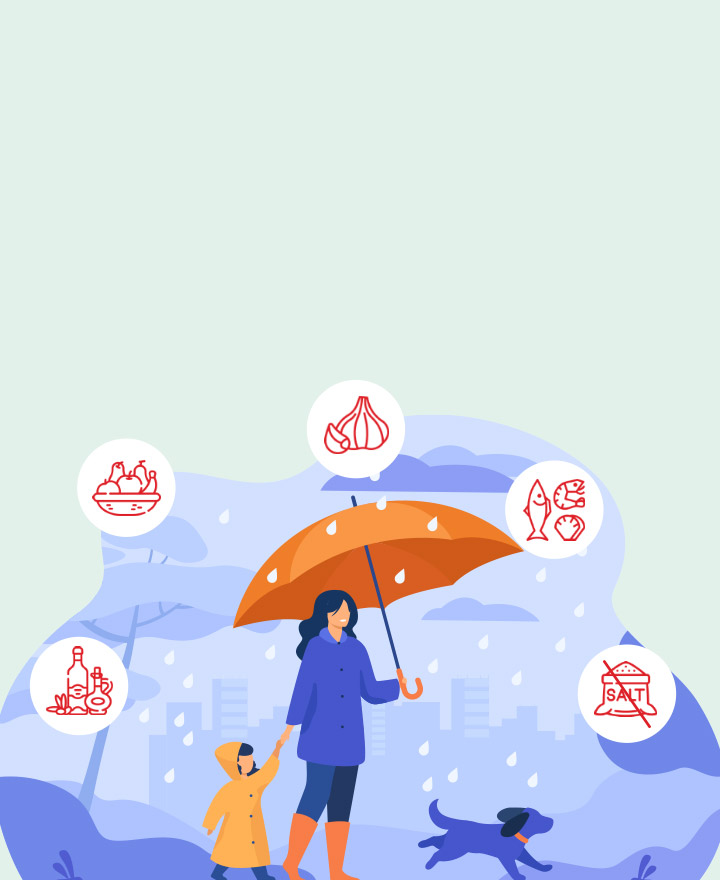

Cholera Outbreaks in Rainy Season
The very word 'cholera' brings back the horrific memories of a lethal epidemic that broke out in 1817 in Jessore, and then in India. History shows how deadly this infection can be. Caused by the bacterium Vibrio cholerae, this disease affects the small intestine and causes symptoms like watery diarrhoea, vomiting, and dehydration. Read on to learn more about causes of cholera in rainy climates and what measures you can take to prevent its spread.
Causes
Cholera is primarily caused by the bacterium Vibrio Cholerae. In rainy climates, the bacterium finds the most congenial environment to thrive and infect people. Flooding, waterlogging, unavailability of clean drinking water and food, and poor sanitation are some of the primary triggers for cholera. In places with rainy climates, these triggers are always present and play a significant role in causing an outbreak of the deadly cholera disease.
In a flooded or waterlogged area due to heavy rains, the following causes of cholera may exist
• Unhygienic water used for consumption and other chores
• Ice made from contaminated water
• Food cooked in unclean, contaminated water
• Contaminated drinks and foods sold by roadside vendors
• Undercooked seafood or fish caught in unclean water where sewage gets disposed
• Vegetables cultivated with water containing human excreta
Management Tips
Now that you know the main triggers or causes of cholera in rainy climates, you must know what to do and what not to do to avoid getting infected by the cholera bacteria. Here are some simple management tips to save your life if you become infected with cholera:
• ORS Therapy
Dehydration is the main cause of death due to cholera. Taking ORS (oral rehydration solution) frequently can replenish lost fluids and electrolytes, potentially saving you from fatal consequences.
• Intravenous Fluids
In critical situations, intravenous fluids may be necessary to compensate for the loss of fluids due to diarrhoea and vomiting.
• Homemade ORS
If you are unable to purchase ORS from a medical store, you can make your own at home. To prepare ORS, mix 6 spoons of sugar and half a spoon of salt in 1 Liter of water. Take this solution frequently.
• Maintain Hygiene
Maintain good personal hygiene. Wash your hands properly with soap and water after using the toilet, and use hand sanitisers frequently.
• Boiled Water
Drink water only after boiling or purifying it with iodine or chlorine. This will help prevent the disease from worsening.
• Increased Fluid Intake
Increase your fluid intake. You can drink buttermilk, tender coconut water, orange juice, and herbal teas to manage dehydration caused by diarrhoea.
• Ginger or Ginger Tea
Ginger, a commonly used kitchen spice, may help improve digestion. You can either consume grated ginger or drink ginger tea to enhance your digestive capacity.
• Probiotic Yoghurt
Consuming probiotic yoghurt can help combat the bacteria causing cholera. The good bacteria in probiotic yoghurt can destroy the cholera-causing bacteria.
• Zinc Supplements
Zinc supplements have shown proven results in controlling diarrhoea and reducing the duration of the illness. Therefore, consider taking zinc supplements if you are suffering from cholera.
• Antibiotics
Consult a doctor and seek treatment at the earliest opportunity. Your physician may prescribe antibiotics to eliminate the cholera bacteria and manage the severity of the disease.
Conclusion
Cholera is a deadly disease which spreads through the consumption of contaminated food and water containing the bacterium. To mitigate cholera outbreaks in rainy climates, interventions promoting hygiene practices, ensuring access to safe drinking water, and conducting timely surveillance are crucial.
One of the important components of our overall wellness is also being financially secured. Healthcare emergencies can happen any time, but a good health insurance policy can protect you from such uncertain situations. To know more about Wellness and other health related tips, visit the wellness corner.
Source: britannica.com, webmd.com, ncbi.nlm.nih.gov, gmr.scholasticahq.com, thehealthsite.com
Disclaimer: This blog provides general information and discussions about health and related subjects. The information and other content provided in this blog, website or in any linked materials are not intended and should not be considered, or used as a substitute for, medical advice, diagnosis or treatment. Kindly contact your Doctor before starting a new medicine or health regime.
Related Articles
Common Monsoon Diseases And How To Prevent Those?
Waterborne Illnesses: Causes & Symptoms
What Are The Best Health Tips For Monsoon?
Dealing With Seasonal Affective Disorder In Monsoon
Published on August 7, 2024














 Health Insurance
Health Insurance  Travel Insurance
Travel Insurance  Car Insurance
Car Insurance  Cyber Insurance
Cyber Insurance  Critical Illness Insurance
Critical Illness Insurance
 Pet Insurance
Pet Insurance
 Bike/Two Wheeler Insurance
Bike/Two Wheeler Insurance  Home Insurance
Home Insurance  Third Party Vehicle Ins.
Third Party Vehicle Ins.  Tractor Insurance
Tractor Insurance  Goods Carrying Vehicle Ins.
Goods Carrying Vehicle Ins.  Passenger Carrying Vehicle Ins.
Passenger Carrying Vehicle Ins.  Compulsory Personal Accident Insurance
Compulsory Personal Accident Insurance  Travel Insurance
Travel Insurance  Rural
Rural